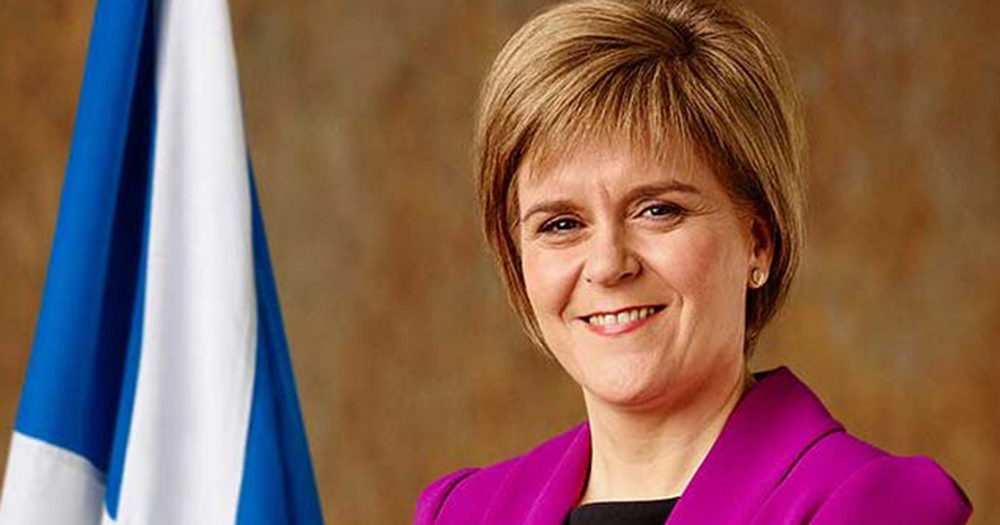After eight years as the First Minister of Scotland, on Wednesday, February 15, Nicola Sturgeon announced her resignation from the role. Due to step down once a successor is found, the Scottish National Party (SNP) leader leaves behind a legacy of proud LGBTQ+ allyship.
Confirming the unexpected news at a press conference at her official residence of Bute House in Edinburgh, Sturgeon said, “To all of the people of Scotland, whether you’ve voted for me or not, please know that being your First Minister has been the privilege of my life. Nothing, absolutely nothing I do in future will ever come anywhere close. Thank you from the very bottom of my heart.”
Nicola Sturgeon became the First Minister of Scotland and leader of the SNP in 2014 after the independence referendum failed. Throughout her two terms in office, she has aligned herself as a proud LGBTQ+ ally, and most recently oversaw the passing of the Gender Recognition Reform Bill, making it easier for trans people to access Gender Recognition Certificates.
Despite being approved, on January 16, the UK government announced it would block the legislation, invoking Section 35 of the 1998 Scotland Act for the first time in history. Sturgeon condemned this decision, describing it as a “full-frontal attack on our democratically elected Scottish Parliament and its ability to make its own decision on evolved matters”.
Speaking to the BBC earlier in the year, the First Minister declared her plans to challenge the Tories in court in defence of “Scottish democracy,” however, this responsibility will now fall to her successor.
Nicola Sturgeon is a once in a generation politician, driven by an unwavering passion for her country.
Her political conviction that fairness and equality should be the guiding principles of all progressive governments has been a beacon of light in recent years. pic.twitter.com/rjVCwfVgXS
— Adam Price ????????️? (@Adamprice) February 15, 2023
When asked at Wednesday’s press conference if the debate surrounding her transgender politics was the “straw that broke the camel’s back” regarding her resignation, Sturgeon said: “No, that issue wasn’t the final straw.”
She called herself “a voice for inclusion, equality, human rights and dignity,” adding, “I have been and always will be a feminist. I will fight for women’s rights and stand up against threats to women’s rights every day that I have breath in my body.
“But I’ll also stand up for any stigmatised, discriminated-against, marginalised and vulnerable group in society.”
She continued: “Call me an optimist, but I believe these things must, in any progressive, liberal, inclusive society, find ways of coexisting. Whatever role I play in politics in the future, I will always seek to do everything I can to turn that into a reality.”
As well as overseeing the Gender Recognition Reform Bill, Sturgeon has also previously spoken out in favour of banning conversion therapy, stating that if the UK government didn’t take “serious action,” she would bring forward the legislation in Scotland.
Few words on Nicola Sturgeon – Scotland’s greatest ever leader. pic.twitter.com/NnzOnehyBG
— India Willoughby (@IndiaWilloughby) February 15, 2023
However, the politician has also faced some criticism, and in 2021 was accused of failing to tackle transphobia in the SNP, causing many young members to leave. At the time, she said this “grieved her deeply” and committed to making the party “a safe, tolerant or welcoming place for trans people”.
Taoiseach Leo Varadkar responded to the news of Nicola Sturgeon’s resignation, describing her as “a very warm person, articulate and thoughtful, and a very capable politician, who showed huge commitment to her country”.
Sinn Féin Vice President Michelle O’Neill also paid tribute to the outgoing leader, saying that “she leaves a legacy for which anyone in politics or public life would be rightly proud”.
It’s with deep regret to see Nicola Sturgeon’s resignation
Nicola is a formidable leader who very ably represented the best of Scotland as First Minister
She made huge strides in advancing Scottish independence & standing up for Scottish interests
Her leadership will be missed pic.twitter.com/OSN5MI3jBJ
— Michelle O’Neill (@moneillsf) February 15, 2023
© 2023 GCN (Gay Community News). All rights reserved.
Support GCN
GCN is a free, vital resource for Ireland’s LGBTQ+ community since 1988.
GCN is a trading name of National LGBT Federation CLG, a registered charity - Charity Number: 20034580.
GCN relies on the generous support of the community and allies to sustain the crucial work that we do. Producing GCN is costly, and, in an industry which has been hugely impacted by rising costs, we need your support to help sustain and grow this vital resource.
Supporting GCN for as little as €1.99 per month will help us continue our work as Ireland’s free, independent LGBTQ+ media.

comments. Please sign in to comment.